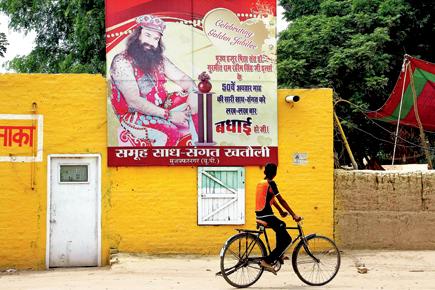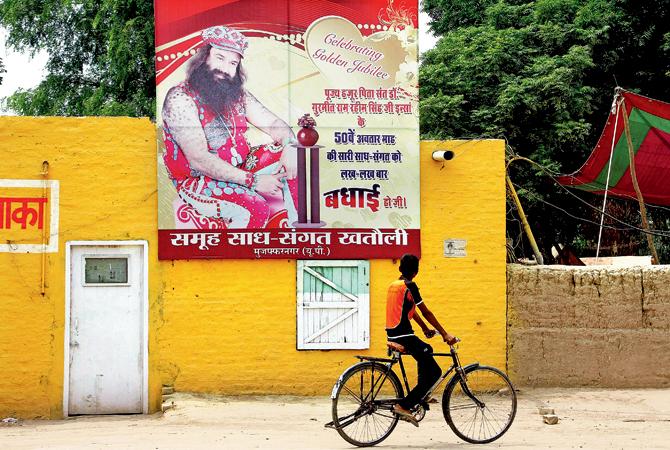Right to privacy is the greatest judgment made in recent or even distant memory as it questions the tyranny of community

Since Gurmeet Ram Rahim Singh speaks to a large community, apparently, he has power and jurisdiction over his women devotees and that includes rape. Pic/AFP

Since Gurmeet Ram Rahim Singh speaks to a large community, apparently, he has power and jurisdiction over his women devotees and that includes rape. Pic/AFP
ADVERTISEMENT
 Stating that the Supreme Court judgment making privacy a fundamental right was a mistake, a well-known right-wing commentator explained to those of us cursed with lower levels of understanding how giving rights to the individual was against the Indian concepts of family, community, society and faith. This idea of the upstart individual is a Western notion which presumably has no place in traditional India.
Stating that the Supreme Court judgment making privacy a fundamental right was a mistake, a well-known right-wing commentator explained to those of us cursed with lower levels of understanding how giving rights to the individual was against the Indian concepts of family, community, society and faith. This idea of the upstart individual is a Western notion which presumably has no place in traditional India.
To be fair, I am going to assume that the said commentator was only trying to defend the Government of India, which had argued against privacy being a fundamental right. And to give that argument validity, why not throw in a bit of pop sociology. Of course, to take his line of thought further, the Supreme Court is a western concept, so is democracy, so is the Constitution, so is writing in English. So perhaps we need to discard all of them and genuflect at the feudal medieval court of Emperor Narendra Modi?
However, as far as I am concerned, this is the greatest judgment made in recent or even distant memory. A full nine-judge bench of the highest court in the land unanimously — in six lucid, erudite voices — gave Indian citizens the right to be free to control their own lives. Many of these rights question the tyranny of community and society and family and faith. They allow the individual to eat, dress, think, love the way he or she wants.
A few hundred years ago, your family and community wanted you to be burnt alive on your husband's funeral pyre. Luckily, some Western notion of murder made that practice illegal. Ironically, those right-wing Hindutva proponents applauding the Supreme Court judgment making instant divorce illegal in India are not weeping about the loss of the power of family, community and faith when it comes to Muslim women. Instead, they applaud the newfound individual rights of Muslim women — as they should. How hypocritical or how Western or both?
You see the same bogus argument was made by those who support Gurmeet Ram Rahim Singh, boss of the Dera Sacha Sauda, now convicted on charge of rape. Because Singh speaks to a large community, he has power and jurisdiction over his women devotees and that includes rape. Further, the violence unleashed by his supporters is also excusable because a massive group of people believed in him. Luckily, some courts in India do not buy the logic that the "sentiment" of a community is more important than law or indeed than women being raped.
The right-wing commentariat must also oppose individual rights because they must support the government in power. Therefore, even if they hated the Aadhaar scheme when the UPA government introduced it — as Modi did when he was the chief minister of Gujarat — they must now support it. The UPA left several loopholes as far as privacy and Aadhaar went, but they did not make it mandatory. The Modi government made it mandatory in many insidious ways, even as various Supreme Court pronouncements reiterated that enrolment in the Unique Identification Scheme was voluntary.
This outright defiance of the highest court of the land was presumably a show of strength against the Western notion of justice. Interestingly, the Modi government's track record on Aadhaar goes directly against its election promise of "minimum government, maximum governance".
It is the Supreme Court of India that has given us a chance to breathe through maximum government control. In today's India, who we love, what we eat, what we drink and what we wear have all been under attack by a socially conservative government trying to impose the collective view of its religious community on all of us. This Supreme Court judgment will have a bearing on laws on beef consumption, on prohibition, on sexual choice and inter-faith marriages, as well as on data privacy and government snooping.
All of these individual choices have over the years in India been attacked and never more so than under the current dispensation. The brave people who fought against the government and for the right to privacy have done us an incalculable service and we owe them our gratitude. To live in a democracy is not just about the right to vote. It is about the right to be. It is about freedom of thought and expression. It is about the right to choose. Thank you for that, against all the odds!
Ranjona Banerji is a senior journalist. You can follow her on Twitter @ranjona Send your feedback to [email protected]
 Subscribe today by clicking the link and stay updated with the latest news!" Click here!
Subscribe today by clicking the link and stay updated with the latest news!" Click here!






